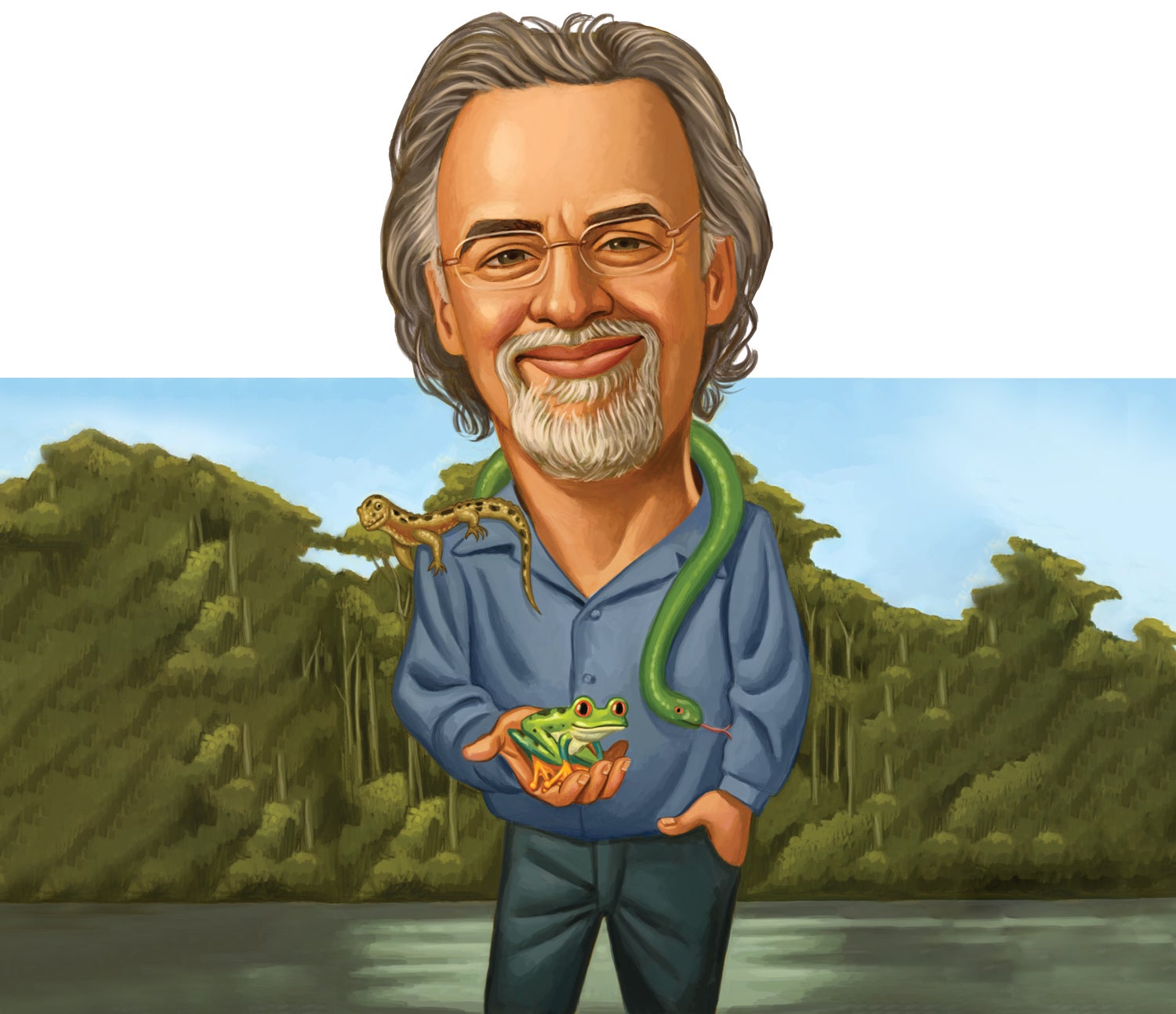R STAR: PAUL HAMILTON ’92, M.S. ’95
THE PRESERVER
Paul Hamilton has spent his career
sticking up for overlooked animals.
By Eric Butterman
Paul Hamilton (Illustration by Mike Tofanelli)
e’ve all seen it, and maybe even shed a tear because of it — the TV commercial asking you to help save the lives of dogs and cats in need. But when is the last time you saw an ad about saving a frog? Or a salamander? That’s exactly what biologist Paul Hamilton has dedicated his life to doing. He founded The Biodiversity Group in 2002, a Tucson, Arizona-based nonprofit focused on discovering and protecting species that fit in the palm of your hand, many of which are vital to the survival of their native ecosystems. The group has also helped preserve important habitats around the globe and educated youth about the importance of our biological world. The team includes one full-time biologist, though field work often involves five to 10 experts from around the world working together. When not in the field, the organization brings biologists together to analyze data and work on species descriptions.
“I was a military brat, but wherever I went there were these animals to observe and learn from,” said Hamilton, 50, about how his passion for animals began.
His work with the group has taken him to countries such as Vietnam and Ecuador. Recently, he transitioned to an advisory role after serving as executive director.
“We have gone to areas of the world where not a lot of biologists have been, and we don’t even necessarily know what’s out there,” explained Hamilton, who received his bachelor’s and master’s degrees in biology from UC Riverside. “There is a company that wants to come in and raze an entire rainforest in a region, which includes the habitat for frogs we discovered. You get the word out — you want to stop this from happening.”
The group’s advocacy has led to hundreds of acres of degraded land being purchased by private foundations for reforestation in Ecuador.
“It’s important land for the ecosystem,” he said. “Many times, we don’t think about the species that will die if we don’t act, and how they help the environment and all of us.”
The organization was also able to help get an animal on the endangered species list — the Chinese crocodile lizard.
“It’s known as a sleepy lizard because it spends most of its time hanging out,” he said. “We found them at night by using flashlights. They have tails and skin like crocodiles.”
Hamilton and the team even managed to bring an animal back from the (presumed) dead after rediscovering a frog that had been declared extinct in 1973.
“But we found it!” he said. “It’s alive! Those surprises are incredible.”
Hamilton said UC Riverside and the researchers he learned from had a big impact on his life, pointing to biology professor David Reznick and Marlene Zuk, an evolutionary biologist who’s now a professor at the University of Minnesota, as particularly influential.
“Both improved my understanding in biology in a way which gave me strengths that I took to what would become my work,” he said. “Their dedication was inspiring.”
Speaking from Mexico, Hamilton said his new role with The Biodiversity Group allows him more time to focus on his new venture, Triplefin Expeditions, an organization he founded with his wife, Stephanie Jo Bowman, who also started The Biodiversity Group’s youth initiative. The couple now works with scientists, visual artists, and others to understand the intriguing biodiversity of the Sea of Cortez, living full time on a boat that doubles as a research vessel. The Sea of Cortez, located just below California off the west coast of Mexico, has a great need for conservation and quite a bit of undescribed biodiversity, he said. When the COVID-19 pandemic broke out, Hamilton and Bowman were hosting a crew from the BBC Natural History Unit as they filmed a David Attenborough documentary in the area. Unfortunately, the shoot had to be canceled.
“Now, we are heading out of harbor with a hefty supply of food and toilet paper that was for that trip!” he wrote in mid-March. “We’ll be self-quarantining out in the Sea of Cortez for the indefinite future.”

